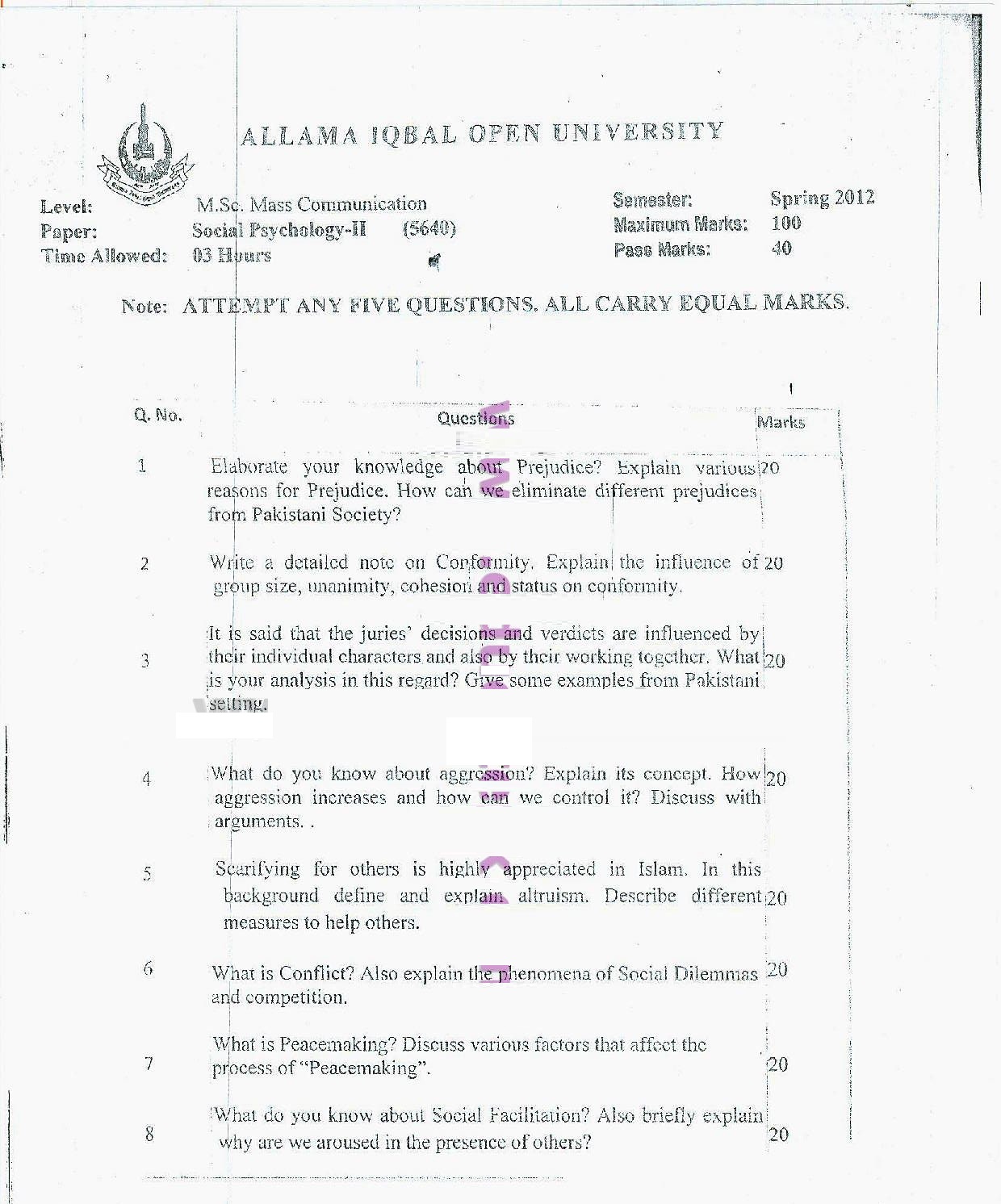MSc Mass Communication Spring 2012 Social Psychology – II Code 5640 Allama Iqbal Open University, Islamabad
MSc Mass Communication Spring 2012 Social Psychology – I Code 5639
MSc Mass Communication Spring 2012 Social Psychology – I Code 5639 Allama Iqbal Open University, Islamabad
Factors in The Process of PEACE MAKING
Some powerful forces can transform hostility into harmony. In the light of this statement, discuss the factors that can play an important role in the process of “PEACE MAKING”. Peace Making? The term “peacemaking” is used in two ways. First, peacemaking is sometimes used to refer to a stage of conflict, which occurs during a crisis or a prolonged conflict after diplomatic intervention has failed and before peacekeeping forces have had a chance to intervene. In this context peacemaking is an intervention during armed combat. The second way the term is used is to mean simply “making peace.” Idea of making peace implies a certain devotion towards that goal. Peacemaking is necessary and important in cases of protracted violence that do not seem to burn themselves out and in cases where war crimes and other human devastation demand the attention of outside forces. In both cases, peacemaking always implies the […]
Increase Altruism and Different Measures to Help Others
How can we increase altruism? Describe different measures to help others. Altruism or selflessness is the principle or practice of concern for the welfare of others. It is a traditional virtue in many cultures and a core aspect of various religious traditions, though the concept of “others” toward whom concern should be directed can vary among cultures and religions. Altruism or selflessness is the opposite of selfishness. Altruism can be distinguished from feelings of duty and loyalty. Altruism is a motivation to provide something of value to a party who must be anyone but one’s self, while duty focuses on a moral obligation towards a specific individual (e.g., a god, a king), or collective (e.g., a government). Pure altruism consists of sacrificing something for someone other than the self (e.g. sacrificing time, energy or possessions) with no expectation of any compensation or benefits, either direct, or indirect (e.g., receiving recognition […]
Prejudice and Social Sources of Prejudice
What is prejudice? Elaborate social sources of prejudice with examples from Pakistani Society. Prejudice: Prejudice is a baseless and usually negative attitude toward members of a group. Common features of prejudice include negative feelings, stereotyped beliefs, and a tendency to discriminate against members of the group. While specific definitions of prejudice given by social scientists often differ, most agree that it involves prejudgments (usually negative) about members of a group. Types of Prejudice Prejudice can be based upon a number of factors including sex, race, age, sexual orientations, nationality, socioeconomic status and religion. Some of the most well-known types of prejudice include: Racism Sexism Classicism Homophobia Nationalism Religious prejudice Agism Prejudice and Stereotyping When prejudice occurs, stereotyping and discrimination may also result. In many cases, prejudices are based upon stereotypes. A stereotype is a simplified assumption about a group based on prior assumptions. Stereotypes can be both positive (“women are […]
Persuasion, Elements of Persuasion and Resisting Persuasion: Attitude inoculation
What is persuasion? What are the essential elements of Persuasion? Give summary of the case study “Resisting Persuasion: Attitude inoculation”. Persuasion : Persuasion refers to the process by which a person’s attitudes or behaviour are, without duress, influenced by communication. Persuasion pervades over almost all human activities and it is geared to information transmission in such a way as to get people to revise old pictures (Predisposition) in their minds, or form new ones, and thus change their behaviour. To some others persuasion is seen as “Communication to influence choices”. Still to others it is “a process that changes attitude, belief, opinion or behaviour”. Actually, we try to sell ideas, concepts, products etc. through the art of persuasion. Persuasion may be carried out in offices, workplaces, homes, etc. by fellow workers or neighbours. Persuasion has been treated as an art, a craft and a science since ancient times and classical […]
